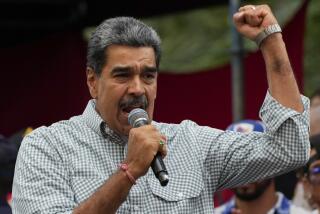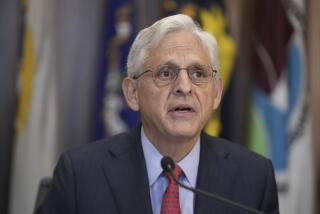Russians call U.S. arrests ‘baseless and unseemly’
- Share via
Reporting from Washington — The Russian Foreign Ministry said Tuesday that the arrests in an alleged Moscow-run “deep cover” spy operation in the United States were “baseless and unseemly,” and suggested the case could hurt U.S.-Russian relations.
“It is deeply regrettable that such things happen in the backdrop of a ‘reset’ in Russian-American relations,” the ministry said in a statement. The defendants, the ministry said, “have not perpetrated any actions detrimental to the interests of the U.S.”
Russian Prime Minister Vladimir Putin was more guarded, saying he hoped the scandal would not derail efforts to improve conditions between the two countries. “We hope,” he said, “that people who value dearly the Russian-U.S. relationship understand this.”
U.S. officials defended the multi-year FBI investigation, saying they hope the arrests of 11 alleged Russian spies will not endanger a “more trusting relationship” between Washington and the Russian Federation.
“We’re beyond the Cold War,” said Philip Gordon, assistant secretary of State for European affairs. “I think our relations absolutely demonstrate that. But I don’t think anyone was hugely shocked to know that some vestiges of old attempts to use intelligence are still there.”
White House Press Secretary Robert Gibbs said President Obama had been briefed on the investigation “a number of times” and believes law enforcement officials “acted appropriately.” Gibbs added that the White House does not believe “this will affect” U.S.-Russian relations.
Ten people were arrested over the weekend in Virginia, New Jersey, New York and Boston.
On Tuesday, an 11th suspect, identified as Christopher R. Metsos, was picked up in Cyprus on a “red alert” issued by Interpol. According to Cyprus police, Metsos was traveling on a Canadian passport and about to board a flight to Budapest, Hungary, when he was detained. He was released on bail.
Unlike the other defendants, many of whom not only lived in the U.S. but also were working and raising families to “Americanize” themselves here, Metsos was described by the FBI as a Canadian citizen who traveled “regularly” to the U.S.
The FBI said Metsos met often with some of the other alleged conspirators in New York. He allegedly received money from a Russian agent and buried it in a park in a Washington suburb in Northern Virginia.
According to the charges of conspiracy to act as unlawful agents of a foreign government and to commit money laundering, the defendants were involved in years of spy recruiting and data collection that included gathering information about nuclear weapons research, Pentagon planning operations and U.S. policies toward Central Asia.
There were no charges of espionage, and it remained unclear whether any serious U.S. intelligence was breached. But, according to court documents, the operatives did seek connections with high U.S. government officials, including an unnamed former national security official.
The real danger, as both U.S. and Russian officials said Tuesday, may be in how the case is interpreted on the global stage.
“The Cold War is over,” Georgetown University professor Paul Pillar, a 28-year veteran of the CIA, said in an interview. “But there are Russian national interests that leaders in Russia believe will be served by information that only can be gathered through espionage.”
However, Nikolai Kovalyov, a former head of intelligence in Moscow, said the idea of Russian spies with fake passports hiding money in bottles and burying it in parks is worthy of “Homeric laughter.” He added, “It’s a cheap detective story not worthy of Agatha Christie.”
Michael Farbiarz, an assistant U.S. attorney in New York, said in court Monday that the charges against the 11 individuals are serious and the defendants should be denied bail when they return to court Thursday. “These people trained together,” he said. “At the core of this is deception.”
Times staff writer Sergei L. Loiko in Moscow and Washington bureau reporter Ken Dilanian in Colorado contributed to this report.
More to Read
Sign up for Essential California
The most important California stories and recommendations in your inbox every morning.
You may occasionally receive promotional content from the Los Angeles Times.














